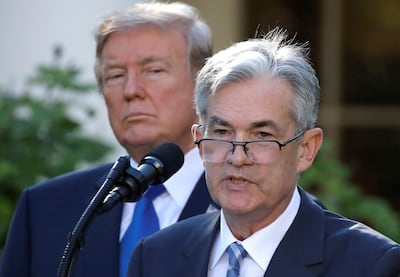Federal Reserve Chairman Jerome Powell said on Wednesday that the US central bank has time to consider when to begin cutting interest rates, citing economic strength and recent inflation data.
“Given the strength of the economy and progress on inflation so far, we have time to let the incoming data guide our decisions on policy,” he said during an address at Stanford University’s Graduate School of Business.
Recent data showed that consumer price index inflation, or CPI, increased 0.4 per cent on a monthly basis in February, while employers added 275,000 jobs. Both figures exceeded projections.
“Recent readings on both job gains and inflation have come in higher than expected,” he said.
Despite this, he still expects the Fed to cut interest rates at some point this year.
“The recent data do not, however, materially change the overall picture, which continues to be one of solid growth, a strong but rebalancing labour market, and inflation moving down towards 2 per cent on a sometimes bumpy path,” he said.
The Fed first began raising interest rates in 2022 after the US experienced a surge in inflation, which at one point peaked at 7.2 per cent.
The UAE, Saudi Arabia and other countries whose currencies are pegged to the dollar have followed the Fed’s rate decisions. The US central bank has kept its target range steady between 5.25 per cent and 5.50 per cent since July.
Mr Powell’s remarks follow the core Price Consumption Expenditures (PCE) Price Index – the Fed’s preferred inflation metric – slowing on a month-to-month and annual basis in March. He had said that number was more in line with what the Fed wants to see.
“It is too soon to say whether the recent readings represent more than just a bump,” he said, again suggesting the Fed needs greater confidence before it is to begin cutting rates.
He did not specify how many rate cuts he expects this year.
But regional Fed presidents have publicly stated their projected number of rate cuts, showing there is some disagreement within the Federal Open Market Committee.
San Francisco Fed and Cleveland Fed presidents Mary Daly and Loretta Mester both said they believe three rate cuts are appropriate this year. Meanwhile, Atlanta Fed president Rafael Bostic foresees only one rate cut in 2024.
Dissenting votes during Fed policy decisions has become exceptionally rare under Mr Powell’s leadership and economists have argued that unanimity in voting is critical to maintaining confidence in the central bank’s decision-making.
Powell defends Fed’s independence as 2024 election comes into focus
With the 2024 US election cycle now in full swing, Mr Powell also used his remarks to defend the Fed’s independence.
The Fed was awarded significant independence by Congress when it was first created more than a century ago, and its policies and mandates can only be changed through legislation. Policymakers on the Fed’s board also serve terms that do not coincide with presidential elections.
Recently, the Fed has come under pressure to cut interest rates by some congressional Democrats who argue higher rates are harming low-income households.
Meanwhile, former president Donald Trump has accused the Fed chairman of considering cutting rates to help Democrats and President Joe Biden’s re-election bid.
As president, Mr Trump also accused Mr Powell of raising rates to harm the economy. Federal law is unclear whether or not a president can fire a Fed chairman, and this has never been tested in court.
Mr Powell has shrugged off political pressure he has faced during hearings or briefings.
“It doesn’t matter what the election calendar is saying,” he said.
“I think we know that but it’s a communication issue, but people need to understand that’s what we do.”
“This independence both enables and requires us to make our monetary policy decisions without consideration of short-term political matters.”
To maintain public trust, he said the Fed should avoid “‘mission creep’” by steering clear of issues like immigration, spending policies and climate change.
Mr Powell was first nominated to serve as Fed chairman by Mr Trump in 2018. Mr Biden nominated Mr Powell to a second term in 2021.
His current term expires in 2026.
Updated: April 03, 2024, 6:34 PM
Credit: Source link




